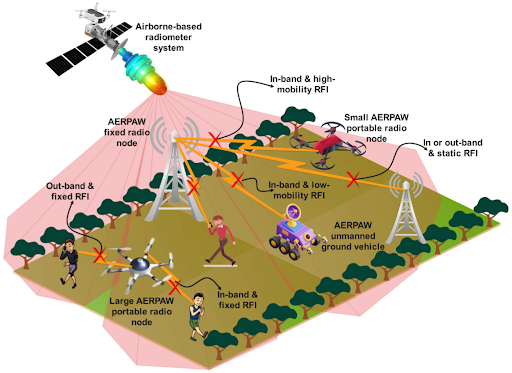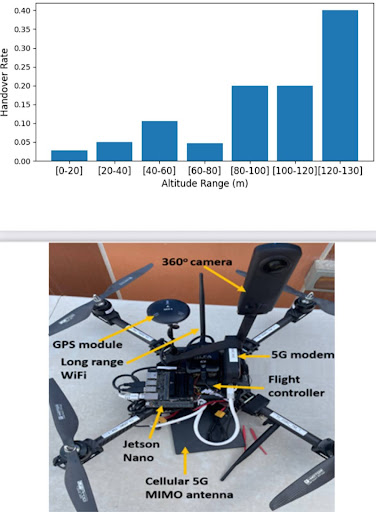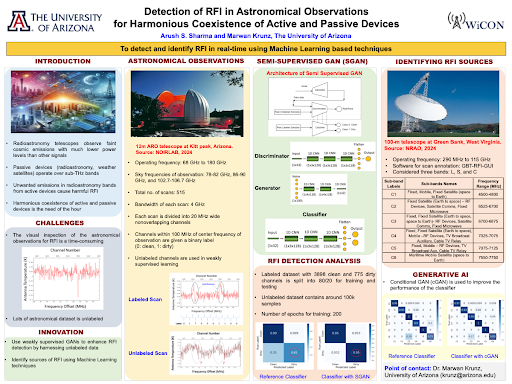We are pleased to announce that we are accepting applications for the 2025 CyberPowder Fellows Program. CyberPowder is an NSF-funded wireless networking hands-on training and research mentoring program for US-based graduate students. (NSF CyberTraining award number: 2417934)
The CyberPowder Fellows Program addresses the problem that wireless experimental research is inherently multidisciplinary, crossing the EE and CS divide; that wireless networking is undergoing rapid technology and regulatory change; and that today’s wireless testbeds are highly sophisticated, which also means they require significant training to use. The Program is led by three professors across EE and CS at the University of Utah, Neal Patwari, Robert Ricci and Kobus Van der Merwe, with support from the POWDER platform technical staff. The Program trains students across the wireless stack to perform wireless related research on POWDER, the world’s largest openly-accessible software-defined wireless testbed. POWDER is deployed across the University of Utah campus in Salt Lake City and remotely accessible from anywhere in the world.
The CyberPowder Fellows Program consists of:
Why should you apply?
The CyberPowder Fellows Program is free to the selected graduate student Fellows, including travel to Salt Lake City for the week-long research exploration.
How to apply:
For full consideration please apply by November 29th 2024. Selected Fellows will be notified by December 10th 2024.
Important dates and planned timeline for 2025 CyberPowder Fellows Program:
Note that while the CyberPowder Fellows Program is primarily aimed at US based graduate students, we might be able to accommodate a small number of non-US students. (Such participants will not be eligible to receive travel funds.) Please contact us if you might be interested in this option.
Enquiries please email at: cyberpowder@powderwireless.net
The online training part of CyberPowder will involve weekly two-hour Zoom sessions that will run from Friday 1/10/2025 through Friday 4/25/2025. (Anticipated meeting time will be 10am-noon MT.)
Most online sessions will involve two components: (1) Classroom style teaching/lecturing and (2) In-class hands-on exploration of the covered material using the POWDER platform. (POWDER is fully remotely accessible.) Selected CyberPowder Fellows will be expected to attend all training sessions.
During the online training period, there will also be a number of at-home hands-on assignments. Some of the Friday sessions will be dedicated to virtual office hours with CyberPowder staff to provide support with these assignments.
Topics (subject to change) to be covered during the online training will include the following sessions (Lecture (L), In-class hands-on (IH)):
CyberPowder staff will engage with Fellows and their advisors to understand their research objectives and support them in defining experimentation plans that will allow them to evaluate their research on POWDER.
We expect this phase to run in parallel with the online training activities, with a goal of having each Fellow define a specific experimentation plan before the in-person exploration event.
In-person research exploration will be a weeklong event at the POWDER facility on the University of Utah campus in Salt Lake City, Utah. Fellows will be reimbursed for travel, lodging and meals. (Details to be provided.)
The CyberPowder staff and POWDER platform staff will be available during this week to support Fellows with their exploration.
We are planning to have a demonstration session at the end of the week where Fellows will be able to present their experiments to invited guests.
The CyberPowder Fellows Program addresses the problem that wireless experimental research is inherently multidisciplinary, crossing the EE and CS divide; that wireless networking is undergoing rapid technology and regulatory change; and that today’s wireless testbeds are highly sophisticated, which also means they require significant training to use. The Program is led by three professors across EE and CS at the University of Utah, Neal Patwari, Robert Ricci and Kobus Van der Merwe, with support from the POWDER platform technical staff. The Program trains students across the wireless stack to perform wireless related research on POWDER, the world’s largest openly-accessible software-defined wireless testbed. POWDER is deployed across the University of Utah campus in Salt Lake City and remotely accessible from anywhere in the world.
The CyberPowder Fellows Program consists of:
| Week # | Date | Topic | Preparation | Activity |
|---|---|---|---|---|
| 1 | Jan 10 | CyberPowder Introduction, POWDER Concepts & Workflow, Basic POWDER Experiment | Read POWDER: Platform for Open Wireless Data-driven Experimental Research to the end of Section 4 | Program Overview (NP), POWDER Overview (DJ), IH 1 Spectrum Monitoring |
| 2 | Jan 17 | POWDER Profiles, Resources & Reservations, Mobile Networking | Read:
Released:
|
POWDER Workflow Essentials (KW), IH 2 POWDER Workflow Essentials, 5G Introduction & Architecture (KV) |
| 3 | Jan 24 | Digital Communications/Modulation Fundamentals | Read:
Released:
|
Shout Measurement Framework (KW), Modulation and Coding, PHY, & Radio Transmission (NP), IH 3 Hands on Receiver Design |
| 4 | Jan 31 | Wireless Fundamentals | Read:
Released:
|
Multipath Fading, Fading Mitigation Methods -- OFDM and SS, Channel Measurement, IH 4 OTA Channel Impulse Response Measurement |
| 5 | Feb 7 | Mobile Radio Access Network & Mobile Core | Read:
|
Mobile RAN & Core (KV), IH 5 End-to-end 5G SA, IH 5 End-to-end 5G SA Part 3 |
| 6 | Feb 14 | Support with Hands-on and Research Plans | CyberPowder Staff Available for Consultation | |
| 7 | Feb 21 | Research Evaluation & Artifact Creation | IH 6 Package Research Artifact - Evaluating Experiments in the Wireless World | |
| 8 | Feb 28 | Research Evaluation & Artifact Creation | Reproducible Experimentation in the Wireless World (RR) | |
| 9 | Mar 7 | Open RAN | Read:
|
O-RAN (KV), IH 7 O-RAN, IH 7 O-RAN Part 3 |
| Mar 14 | No Class | |||
| 10 | Mar 21 | Open RAN + ML | Read:
|
O-RAN + ML (DM), IH 8 O-RAN + ML, IH 8 O-RAN + ML Part 2 |
| 11 | Mar 28 | Open RAN + ML | Read:
|
O-RAN + ML (DM), IH 9 O-RAN + ML |
| 12 | Apr 4 | Spectrum Management | Read: | RDZ + ZMS (KV,DJ), IH 10 OpenZMS, Spectrum Management (POWDER-RDZ, OpenZMS), IH 10 OpenZMS, Spectrum Management (POWDER-RDZ, OpenZMS) Part 2 |
| 13 | Apr 11 | Spectrum Management | Read (if time):
Released:
|
ZMS, RDZ-in-RDZ (DJ), IH 11 RDZ-in-RDZ, ZMS over-the-air |
| 14 | Apr 18 | Support with Hands-On and Research Plan | CyberPowder Staff Available for Consultation | |
| 15 | Apr 25 | A2 Updated Research Idea/Plan and A3 Information Related to In-Person Exploration due on Wednesday. |
A key component of the CyberPowder Fellows Program is for participants to define a research idea, typically from their graduate research, and develop a plan to perform/evaluate that research on POWDER. Fellows make progress in the execution of that plan during the program, and continue to use POWDER after the program completes.
Information on the 2025 Fellows' projects, for self-selected projects:
| Student, Affiliation & Project |
|---|
 Kaies Al Mahmud, University of Georgia.
Project: SWIFT-SAT: INtegrated Testbed Ensuring Resilient Active/Passive CoexisTence (INTERACT): End-to-End Learning-Based Interference Mitigation for Radiometers. My research addresses the challenge of coexistence between active systems like 5G communication signals and passive sensors like the microwave radiometers used by NASA's earth observation missions. I am building a drone-based radiometer for collecting real-world data in a wireless research testbed and also developing a digital twin for simulated data acquisition. Combining them we will generate a robust dataset essential for developing powerful interference detection and mitigation algorithms. (This work is supported by National Science Foundation (NSF) Grants 2332661 and 2332662.) |
 Hakan Gulec, New York University Tandon School of Engineering.
Project: Extending Low Latency Optimization in Wireless Part of End-to-End Network. My project is to extend the previous work by reproducing the implementation to establish a baseline, implementing queue management and scheduling enhancements in the RAN, and evaluating the modified system in an OTA RF setting. |
| Majumder Haider, Howard University. Project: Digital Twin and AI Integrated Spectrum Sensing in CBRS Band. This project aims to develop a digital twin and AI-integrated framework for accurate spectrum sensing in the CBRS band by predicting site-specific channel state information (CSI). By leveraging a neural network trained on digital twin (DT) computed and real CSI, the system enables precise interference estimation to support intelligent and efficient spectrum utilization. |
| Milad Natanzi, WPI. Project: RICJam. This project will design and evaluate an intelligent anti-jamming system for O-RAN enabled networks using the POWDER platform. We will develop xApp for the RIC to automatically detect jamming from real-time network data and trigger optimal mitigation strategies. |
| Blessing Andrew Okoro, University at Albany, State University of New York. Project: Multi-Dimensional Transmitter Characterization. This project is developing an AI-driven framework for joint time, frequency, and spatial detection of wireless transmitters to improve spectrum monitoring and sharing. This project uses sparse coding and distributed sensing to detect and localize transmitters, even those emitting faint or unintended harmonic signals. The goal is to enable equitable, secure, and efficient utilization of the radio spectrum. |
 Nassim Sehad (scholar page), Aalto University.
Project: Enhancing reliability and effectiveness of UAV teleportation through 5G. The main connectivity issue with UAVs in cellular networks arises from the fact that base station (BS) antennas are typically tilted downward to serve ground users. As a result, UAVs in flight often rely on the side lobes of the BS radiation pattern for connectivity. This leads to fluctuating signal quality and unreliable connections at altitude. The goal of this project is to model side lobe propagation and estimate handover occurrences based on UAV trajectories. (This research was supported by the Business Finland project Drolo II, Dnro 4045/31/2023.) |
 Arush Sharma (website), University of Arizona.
Project: Harmonious coexistence of active and passive devices in a shared spectrum. (paper1, paper2) Goal: Detect and identify Radio Frequency Interference (RFI) in radio-astronomical datasets obtained from radio telescopes (passive devices) using machine learning techniques. Passive devices typically get plagued with wireless man-made signals (active devices). Specifically, I have worked on enhancing RFI detection in datasets obtained from the Kitt Peak Telescope at Arizona Radio Observatory (ARO), leveraging semi-supervised Generative Adversarial Networks (GANs) to improve classification accuracy while minimizing reliance on large labeled datasets. Next steps: After detecting the RFI, pinpoint the source that caused RFI by characterizing the waveforms. |
| Pulok Tarafder, Howard University. Project: Digital Twin and AI Integrated Spectrum Sensing in CBRS Band. This project aims to develop a digital twin and AI-integrated framework for accurate spectrum sensing in the CBRS band by predicting site-specific channel state information (CSI). By leveraging a neural network trained on digital twin (DT) computed and real CSI, the system enables precise interference estimation to support intelligent and efficient spectrum utilization. |
Other CyberPowder Fellows:
